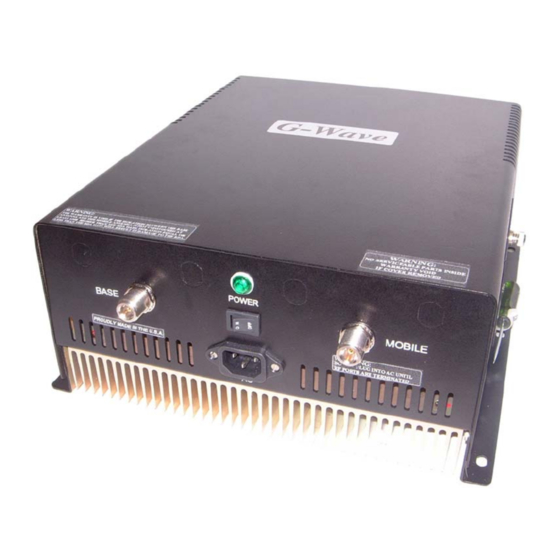
Advertisement
Table of Contents
- 1 Table of Contents
- 2 Bda Overview
- 3 Bda Block Diagram Description
- 4 Electrical Specifications
- 5 Mechanical Specifications
- 6 Environmental Conditions
- 7 Bda Connections
- 8 MECHANICAL OUTLINE DRAWING (Figure 1 & 1A)
- 9 Bda Installation
- 10 Bda Operation
- 11 Uplink Mechanical Outline- Adjustment
- 12 Downlink Mechanical Outline- Adjustment
- 13 Rf Exposure Warning
- 14 Diagnostics Guide
- Download this manual
Advertisement
Table of Contents

Summary of Contents for G-Wave BDA-PS8-2
- Page 1 INSTALLATION OPERATING MANUAL BDA-PS7/PS8-2/2W-80-A DUAL BAND BI-DIRECTIONAL AMPLIFIER...
-
Page 2: Table Of Contents
TABLE OF CONTENTS PARAGRAPH PAGE NO BDA OVERVIEW BDA BLOCK DIAGRAM DESCRIPTION ELECTRICAL SPECIFICATIONS MECHANICAL SPECIFICATIONS ENVIRONMENTAL CONDITIONS BDA CONNECTIONS MECHANICAL OUTLINE DRAWING (Figure 1 & 1a) BDA INSTALLATION BDA OPERATION UPLINK MECHANICAL OUTLINE- ADJUSTMENT (Figure 2) DOWNLINK MECHANICAL OUTLINE- ADJUSTMENT (Figure 3) RF EXPOSURE WARNING DIAGNOSTICS GUIDE... -
Page 3: Bda Overview
BDA OVERVIEW: The BDA assembly extends the coverage area of radio communications in buildings and RF shielded environments. The BDA has dual RF paths to extend coverage in two distinct frequency bands. The unit features low noise figure and wide dynamic range. It is based on a duplexed path configuration with sharp out of band attenuation allowing improved isolation between the receiving and transmitting paths. -
Page 4: Electrical Specifications
ELECTRICAL SPECIFICATIONS: Frequency Range Downlink : 764-776 and 851-869 MHz Uplink : 794-824 MHz Pass band Gain @ min attenuation : 80 dB minimum Variable Step Attenuator Range : 0-30 dB (2-dB steps) Pass band Ripple : ±1.5 dB (typ) °... -
Page 5: Mechanical Specifications
MECHANICAL SPECIFICATIONS: Size : 13.5 x 12.5 x 5.6 inch : (343 x 317.5 x 142.3 mm) RF Connectors : N-type Female Weight : 20.9 Lbs. (9.5kg.) approx. ENVIRONMENTAL CONDITIONS: The unit is designed for indoor applications: Operating temperature: - 20°C to + 50°C Storage temperature: - 50°C to + 90°C BDA CONNECTIONS The BDA AC power is accepted through a standard 3-wire male plug (IEC-320) with... -
Page 6: Mechanical Outline Drawing (Figure 1 & 1A)
Figure 1 IN BUILDING REPEATER BDA Mechanical Outline Figure 1a (Relay Shown in Conditions for Optional Alarm Non-Alarm Condition) The alarm monitors current of both uplink and downlink amplifiers. An alarm condition N.O. will occur if either uplink or downlink amplifiers are over or under its current tolerance. -
Page 7: Bda Installation
BDA INSTALLATION DO NOT APPLY A.C. POWER TO THE BDA UNTIL CABLES ARE CONNECTED TO BOTH PORTS OF THE BDA AND THE ANTENNAS. 1. Mount the BDA on the wall with the RF connectors pointing DOWN. Using appropriate screws and anchors, attach the BDA to the wall at the four mounting holes on the side flanges. -
Page 8: Bda Operation
BDA OPERATION Refer to Figure 2 & 3 for adjustment access location and label. Variable Step Attenuator BDA gain can be reduced by up to 30 dB in 2 dB steps using the variable step attenuator. Gain adjustment is made with rotary switches accessible via the access door on the BDA enclosure. -
Page 9: Uplink Mechanical Outline- Adjustment
Figure 2 UPLI NK (O F F) A L C Uplink Adjustment Access Panel and Label Page 9... -
Page 10: Downlink Mechanical Outline- Adjustment
Figure 3 DOW NLINK (O F F) Downlink Adjustment Access Panel and Label Page 10... -
Page 11: Rf Exposure Warning
RF EXPOSURE WARNING The antenna used for this transmitter must be fixed-mounted on outdoor permanent structures. In order to satisfy the FCC RF exposure requirements, the BDA/antenna installation must comply with the following: The downlink indoor antenna (Omni type or similar directional antenna) must be installed so as to provide a minimum separation distance of 0.35 meters (35 cm) between the antenna and persons within the area.










Need help?
Do you have a question about the BDA-PS8-2 and is the answer not in the manual?
Questions and answers